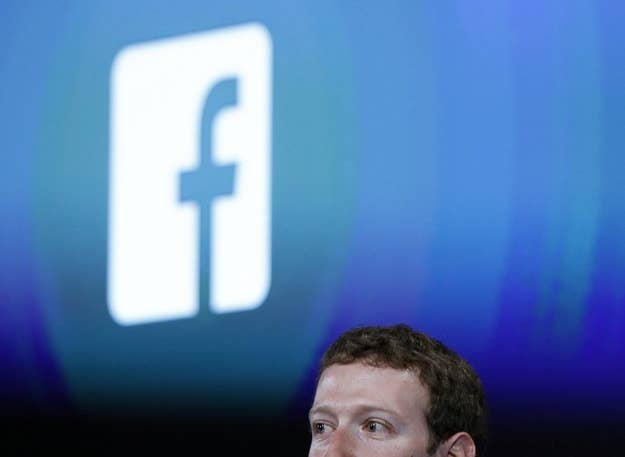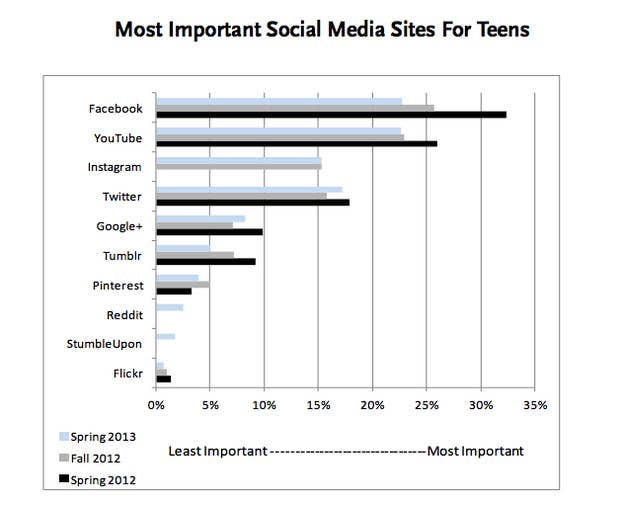
There are more social networks than ever, and more people using them. The sheer variety in social networking, though, has left us with an increasingly narrow definition of what a social network is. Perhaps the only one that applies to all of them, from Twitter to Facebook to Snapchat, is this: a social network is a communications service based on your identity.
It follows, then, that a social network's ability to affect your identity should be considered its most important trait — and that therefore there are two types of social network:
1) Those that simulate social mobility
2) Those that don't
Mobility provides a handy lens through which to judge the networks we use every day — and to understand why we like, or don't like, using them. It also brings them into one of the internet's longest running and most important conversations, from which they've been oddly absent: is the internet a place for opportunity, or a place for reproduction of existing social orders?
Another way to describe this distinction might be to say that some social networks are aspirational, while some replicate what already exists in your life. Some give you a way to become something your aren't, or, more accurately, to alter how people see you, while others, over time, insist on creating a more accurate portrait of who you are.
Twitter is one of the largest, and purest, aspirational social networks. This is built into the site's "Follow"-centric vocabulary. Twitter is a place where you have followers, not friends; a place where following fewer people than follow you is a sign of status; a place where the verification of your real identity is really an acknowledgment that you've become something other than yourself — something better, in Twitter's abstracted terms. Fleeting interaction with celebrities and the powerful fuels users' hopes, giving them the sense, at least, of a level playing field. And while social mobility on Twitter may be overemphasized (it's telling that it's usually defined in terms of celebrity), its algorithms — the closest thing it has to a societal framework — aren't much of a mystery. Famous people in real life are famous on Twitter. You see tweets from people you follow, and people they want to introduce you to. Regular people who post and share tweets people like accrue Twitter fame.
Facebook, the first major social network to require real identities, sits at the other end of the spectrum. If Twitter is the place you go to remake yourself (albeit in a way that very likely will be contained entirely within Twitter), Facebook is the place that won't stop reminding you of who you really are (or were). In a post this week, Cliff Watson wrote of his experience on Facebook:
What is Facebook to most people over the age of 25? It's a never-ending class reunion mixed with an eternal late-night dorm room gossip session mixed with a nightly check-in on what coworkers are doing after leaving the office. In other words, it's a place where you go to keep tabs on your friends and acquaintances.
You know what kids call that? School.
Facebook, to users who joined years ago, can even feel like an engine of downward mobility — at best, visiting is a metaphorical trip home to "the block," where you try to find ways of explaining what your life is like, how it's changed, and how it's gotten better, or how it's gotten worse, without sounding like a jerk, or pathetic, or like you're talking too much about yourself. It's appropriate that, in the year since going public, Facebook has been reminded repeatedly by its new context — the public market — of its own inescapable identity as an ad platform. Its recent experiments in self-expression have been fraught.
Facebook's lack of mobility is sewn into the fabric of the site. Connections for users are symmetrical — a crude digital equivalent to establishing a relationship or an acquaintanceship in real life. If it feels like a popularity contest, it's only in an antiquated sense; it encourages none of the self-as-a-minor-celebrity illusions that Twitter does.
But the overall effect, despite (or because of) its realism, can be grim. Facebook is a place where posts, not people, find mobility. If something you do gets noticed, you get little in the way of lasting benefit — it's a place where users share content, and content doesn't share back. Facebook is a place where brands, not users, can become famous. On Facebook, "followers" are for people who have them in real life.
The other large social networks fall into these categories, too. Tumblr, a space that values performance over all else, and which lets people be both successful and unrecognizable, is an aspirational network, a place where you're encouraged to be who you want to be rather than who you are. Google Plus's ultimate goal, like Facebook's, is to progressively recreate your real-world identity online — it's just starting with a different (private, and arguably therefore more relevant) set of data. LinkedIn is an aspirational service wrapped in realist mechanics. In a much more significant way than Twitter, it's a place that promises to make you into someone else. When that doesn't pan out, the mechanics overwhelm the experience. An impotent LinkedIn profile is the most depressing real estate on social media.

In the context of near-constant Facebook doomsaying, the future may seem to favor upwardly mobile networks. But in reality, it may favor neither. As Watson claims in his piece, the next generation of social networks — message-heavy services like Snapchat, Kik and Whatsapp — are more "social" and less "network" than what came before. They have no outwardly visible social structures and little in the way of profiles. Twitter brought texting to the public internet; these services are taking it back off.
While they don't fit most pundits' ideas of what a social network is, they fit our stripped-down, broad one: they are services based, in a simple way, on identity. Instead, though, they manifest users' identities not as public profiles, but as private handles — a refreshing throwback that also happens to preclude most discussion of discrete mobililty (these services join in on real life more than they mirror it; they create hidden parallel channels rather than online simulacra).
They have less in common with Facebook and Twitter than they do with the social network I've used longer than any other: AIM.
